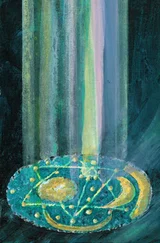I was surprised at how light the crate was. We lifted it and laid it on a dolly. Jones looked at my shoes.
“You better do something about those shoes,” he said.
My black shoes looked dull, but they weren’t dirty. Jones was wearing shoes brought to a high gloss.
“Man that won’t shine his shoes, won’t wipe his ass,” Jones said, as we moved the rotor blade to the front room. A man that won’t shine his shoes won’t wipe his ass? The wisdom of the ages, a certain entry for The Blue Notebook. At the counter, Jones showed me how to fill out the forms and had a mechanic sign for the rotor blade. Jones went back to his desk and I started for mine when I met another second class. He was coming out of the head. His name was Jean Becket.
“The shithouse looks like Poirl Harbuh t’day,” he said.
“You from New York?” I asked.
“New Awlins. Why?”
I tried to explain that in New York, particularly in Brooklyn, people said “poirl” for “pearl” and “terlit” for “toilet.” They could say things like “I dropped my poirls down the terlit.” If Waite Hoyt was pitching for the Dodgers, and something happened to him, they’d say, “Hert’s hoit.” They could also tell you that the men’s room looked like Poirl Harbuh.
“Just like New Awlins,” he said. He had a wide gap-toothed grin and eyebrows that touched, making him look wicked. “What’s your name again?”
It was that easy. Becket showed me the metal bins where smaller parts — tools, nuts and bolts — were stored. Donnie Ray gave me a new Navy coffee cup. The phones were ringing and traffic was heavy at the counter. I watched Jones and Becket work and then I handled a few requisitions myself, and during a lull I took a walk down to the coffee urn.
A bony man with a pinched face stood beside the urn, a cup in his hand. His shirt told me his name was J. T. Harrelson. He groaned softly, then again. I poured myself a cup. Harrelson stared bleakly at the empty morning. His hands trembled.
“You okay?” I said.
“Ah’ll never be okay again,” he said. “That gah-dam white lightnin eats you gah-dam guts out.”
“Maybe you need somethin to eat.”
“Ah’d rather swallow a can of worms.”
Harrelson looked at me, squinting. I must’ve been smiling.
“Who in the hell are you?”
I told him and started to shake his hand. But he was using both hands for his cup.
“And where you from , boy?”
I said the fatal words: New York.
“Gah-dam. Yawl got anybody left in New York? More gah-dam New Yorkers in this man’s Navy now than I seen in thirteen years .”
“Ah, well,” I said and walked away. I didn’t like the hint of coldness about Harrelson, the curl to his lip when he mentioned New York. I went back to my desk and studied the parts catalogs. The coffee cooled and tasted sour.
Suddenly the side door slammed open. A gangly sailor in dirty dress whites lurched into the room. Everything stopped. Donnie Ray looked up from the telephone, at once alarmed and relieved. The sailor was in his twenties and was wearing a third-class AK’s V-stripe. His eyes were wild and red. His big hands waved in the air, jerking, twisting, as if detached from his arms. His shoes were dirty and scuffed. The missing Boswell.
“Hank’s dead!” he screamed.
Donnie Ray came on a run. Becket emerged from the back room and hurried over, with Jones behind him.
Donnie Ray said, “Gah-dammit, Boz, I been looking all over for—”
“Hank’s dead!”
Donnie Ray took his arm but Boswell shook him off.
“Hank’s dead, gah-damnit! Hank is fuckin dead !”
“What are you—”
“Hank Williams ! Hank Williams died, Donnieray ! They found him dead in some car in West Vir gin ia! Just dead. Dead in the back of a Cadillac !”
I’d never heard of Hank Williams. I thought: Why is Boswell so upset? What’s going on here? Then Harrelson was there, his face ashen. He said: “Hank Williams is dead ?”
“ Dead . He’s fuckin dead.”
Boswell’s eyes closed, then widened.
“Dead!” he screamed and sat down hard on the concrete floor. “It’s on the radio. In the fuckin newspapers. Hank’s dead . On New Year’s fuckin Day.”
Harrelson hurried to his desk, took out a small radio and started turning the dials. There were three sailors waiting at the counter now, staring down the hundred-foot length of the Supply Shack, watching us. Donnie Ray leaned over Boswell.
“Boz, you gotta go somewhere, get cleaned up,” he said. “How’d you get on the damned base anyway?”
“The back,” Boswell mumbled. “You know, the hole in the fence …”
Jones and Becket grabbed him under the arms and started to lift his dead weight off the floor. Donnie Ray nodded at me to help. I grabbed Boswell’s waist and together we got him to his feet. Donnie Ray glanced at the people waiting for parts. About five of them now. Boswell started sobbing. “Poor fuckin Hank. Poor skinny redneck bastard. Poor drunk sonuvabitch …” As if describing himself. Then he passed out in our arms.
Donnie Ray said, “Can’t even get him in a shower in this shape. Can’t lay him out in the barracks, or McDaid’ll find him.” He glanced around, then said: “Put him on a pallet.”
He walked quickly away to the front counter. We carried Boswell into the storeroom, with Becket leading the way through the rough wood tunnels formed by stacked crates. In an empty area against the far wall there were a half dozen pallets neatly piled on top of one another. We moved toward them and then Boswell was suddenly awake.
“What the hell you doin?” he said. “Where you takin me?”
“You’re drunk as a skunk, Boz,” Becket said. “We’re gonna let you sleep it off.”
Boswell looked angry and trapped. “You gonna make me?”
“Not if we don’t have to,” Becket said.
There was a pause, as if he were trying to remember something that was very important. Then his eyes widened again.
“Hank’s dead .”
“Yeah, we know that, Boz. It’s a terrible thing. But to be poifectly frank, it aint our business today. We got other things to do.”
Suddenly Boswell shook us off and kicked Becket hard in the stomach. He whirled and punched Jones in the chest with a wild right aimed at his face. Then he turned to me, blinking. He started another roundhouse right and I bent at the knees, went under the punch, and ripped a hook to his belly. He went hooooo . And sat down. He blinked again and then keeled over.
Becket looked at me: “Jesus. Where you loirn to do that?”
“I used to work out,” I said.
“You boxed?” Jones said.
We were lifting Boswell onto a pallet. “A little. I wasn’t very good.”
I didn’t say anything else. I was as astonished as they were at the way Boswell went out from one punch to the body. Anything I said would sound like bragging. Boswell was stretched on a pallet now, and Becket built a little fence of them to hide him. Then Jones laid Boswell’s white hat on his chest.
“Will you look at this man’s shoes?” Jones said.
There are entire years of my life I can’t remember at all, and days that are as dense in memory as granite. That first day on the job at Ellyson Field was one of those. First, I learned about Hank Williams — which is to say, I learned about the American South. I knew only a few things about this vast region of my own country: In the 1860s, the North had fought a bitter, brutal war against the Confederacy, a war that we were taught was about slavery; colored people still were not complete citizens there; southern politicians were figures of fun on radio shows. Good baseball players came from the South and they played a lot of football. But I didn’t know anything about the people; my ignorance extended even to the lies, for I was probably the only person left in America who had not even seen Gone With the Wind . That day I learned that the South of Hank Williams was not the South of Clark Gable and Vivien Leigh. On the day Hank Williams died, the air itself seemed charged with emotion, packed with loneliness and loss, as the radio stations played the man’s songs over and over, the deejays sounding hushed, tearful, even reverent. At first I thought this was comical; I even turned away to smile as the corn-pone voices grieved on the radio. But then, as the words and voices accumulated, I knew they must be serious.
Читать дальше












